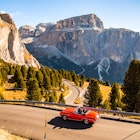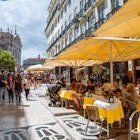

Sunset over Cowpots Camping, Wales © Percolated Design
“My phone doesn't stop ringing – it's gone absolutely ballistic,” says Greg White, owner of Little Haven Campsite, a wild and beautiful eco-camp just minutes from the sea in Pembrokeshire, Wales. Camping is back – and it’s well and truly in style.
Within 24 hours of the UK Prime Minister Boris Johnson announcing that campsites in England could reopen on July 4, the camping website Pitchup recorded its highest number of UK bookings in a single day, and reservations on Cool Camping were 750% higher than the same day last year.
And although Scotland and Wales are yet to open their campsites, bookings have skyrocketed across mainland Europe as COVID-19 restrictions relax. Still campers should expect plenty of change. From contactless check-ins to wildlife corridors, here’s everything you need to know about camping in Europe this summer.

Is camping safe?
Camping is seen as low-risk. The European Centre for Disease Prevention and Control has cited several small-scale reports that show the majority of COVID-19 transmissions occur indoors, but it is known to spread at outdoor events with large crowds, such as football matches. Campsites also have strict measures in place to minimise the spread of the disease.
Although rules differ in each country (and per region in places like Germany and the Netherlands), Ros Pritchard, the Secretary General of EFCO&HPA, that represents the camping and caravan industry at the European level, says the core advice is the same across the continent.
“It is to keep your distance, which is going to be one-meter, use hand sanitizer frequently, and for the business to be cleaning frequently,” she says. Countries such as France and Switzerland have publicly outlined their plans for keeping campsites clean – and in Italy the guidance runs to over 300 pages – but the onus will ultimately fall upon campers to adhere to the local rules.
Consider booking a certified campsite
Not every campsite can fully comply with government guidance, so many will not reopen this summer. Others will only have limited camping options, such as Glottenham Farm, which can only safely offer glamping.
Although those that reopen should be adhering to local rules, the biggest camping website in the Netherlands, ANWB, is using inspectors to ensure its campsites meet regional safety conditions. Each one that does will be highlighted by a special sticker. Visit Britain has also created the "We’re Good To Go" industry standard mark to reassure tourists that the campsite they are visiting has adhered to government guidance.

Check you can actually visit
Although borders are open in some countries, there are still a number of international and regional restrictions in place which could scupper your plans. For example, Norway only currently allows domestic travelers to visit its campsites and the Netherlands still isn’t welcoming anyone from the UK or Sweden. Only campers from neighboring countries are currently welcome in Hungary.
Acsi, which produces European campsite guidebooks, is keeping an updated list of current campsite restrictions here.
Book before you travel
Previously travelers were able to simply arrive at a campsite and pitch up, providing there was space. Now a number of European countries, such as the Netherlands and Croatia, require foreign tourists to reserve their accommodations in advance. Travelers may also be asked to show evidence of their booking at the border, so check restrictions for both your destination and any transit countries.
An increased appetite for camping and strict social distancing measures will mean fewer available pitches, so booking will be all but essential this summer. Some camping websites, like ANWB for the Netherlands, Spain, France, Italy, Denmark and Croatia, are offering flexible cancellation policies should any coronavirus restrictions return.
“We've seen a particular interest in the Coronavirus Booking Guarantee,” says James Warner Smith from Cool Camping about its cancellation policy. “The most-read page on our website remains our Coronavirus Travel Advice for Campers page, showing that people are first and foremost still seeking clarity and information before they book. Our Guarantee has helped sure up confidence.”
If you don’t wish to book through a third-party, speak directly with campsites regarding their policies.

What to pack
There may be an element of self-sufficiency required this summer as some campsites will keep shops, bars and restaurants shuttered, though the likes of Luxembourg, Germany and Austria will allow many to open.
Inquire ahead and take what you might need for the entire trip; this could mean packing sufficient food, a camp stove and cooking fuel. If there’s no restaurant, pack plates, cups, cutlery and washing-up equipment. You may need a personal toilet tent, confirm in advance.
In some countries, such as Spain and Portugal, masks remain mandatory in enclosed spaces, including camp shops and bars. In others, such as Italy, it varies between regions. Wherever you travel, it’s prudent to take a face covering. Many campsites are installing hand sanitizer stations on-site, but it’s still wise to have your own.
Contactless or remote check-ins
To limit on-site interactions, a number of campsites will introduce contactless or remote check-ins, allowing campers to arrive on-site, pay and pitch without having to come into direct contact with staff. One site introducing this is Belair le Camping in the Dordogne, France. It offers either a contactless check-in or a socially distanced arrival, where a staff member will meet campers as usual.
“If they choose a contactless check-in, then we send them a map prior to arrival. I even circle the map to tell them where their tent is,” says owner Laura Pantry. “I also send them a WhatsApp message so they’ve got my direct contact details should they need it.”
Payments can be made remotely online and campers will be given everything they’ll need for their stay in their pre-arranged tent, including a welcome guide. Similar digital maps with pitch locations are being used elsewhere too.

Increased pitch sizes and "wildlife corridors"
With greater social distancing measures in place some campsites are using "wildlife corridors" to mark out pitches. These are areas of tall grass and wildflowers that grow freely between pitches, showing campers the edge of their camp and encouraging them to keep their distance from other tents.
Cowpots Camping in Wales, a 100-acre farm with swathes of traditional agricultural grassland, 50-acres of wetlands and a bluebell wood, has been marking out pitches like this for three years.
“It's great for the wildlife,” says owner Martin Bowman. “We have milkmaids (white flowers) come up in the spring and this white just covers the field, it's so nice.” Buttercups, red and white clovers, perennial ryegrass, bentgrasses, Timothy-grass and yarrow also grow between the pitches, which are all 35-meters apart.
Some facilities will be shut or restricted
"In all European countries, policies have been put into place to ensure safe holidays, with extra cleaning, disinfectant stations, distancing rules, and less contact wherever possible," says Linda Gedink who runs Camping Auf Kengert in Luxembourg.
The campsite has had to make adjustments to its facilities, but most remain open. The swimming pool can only have a maximum of 25 people using it at once and customers must wear masks when entering and leaving the restaurant, or when interacting with staff.
Some modifications in England are stricter. The Bakewell Camping and Caravanning Club Site in the Lake District will reopen but without toilet and shower blocks. Its reception, play areas and laundry facilities will be closed too. Meanwhile in St Ives, Polmanter Touring Park will have a one-way system in its shop. Research ahead and select a campsite that meets your needs.
The restroom and shower situation
While in some countries such as the Netherlands, France and Spain, toilet blocks and showers are reopening on campsites. In other destinations such as England and Slovakia, lines, one-in one-out systems, and bookable shower slots may be in place.
“We are frantically putting in loads of toilets,” says Greg White of Little Haven Campsite in Pembrokeshire, Wales. “Normally we have 20 different pitches, but what we decided to do this year is go down to 12 pitches and have 12 individual toilets, so everyone has one each.”
As well as individual toilets, the site will only offer week-long bookings, with each pitch now spaced more than 10 meters apart. To make room for the individual restrooms, the campsite has had to remove its showers, encouraging campers to bring their own solar showers instead.
This hasn’t deterred potential campers though. Little Haven Campsite has bookings lined up throughout the summer, it’s just waiting for the green-light from the Welsh government so it can open.
You might also like:
The art of escaping the holiday crowds in the UK
Is glamping going to be the new social distancing travel trend?
Britain’s 8 best campsites
Explore related stories

Destination Practicalities
21 local tips to know before traveling to EnglandNov 21, 2024 • 9 min read





 Art and CultureCopy my trip: An unforgettable family trip to Spain with Elsewhere by Lonely Planet
Art and CultureCopy my trip: An unforgettable family trip to Spain with Elsewhere by Lonely PlanetNov 19, 2024 • 4 min read


 BeachesCroatia itineraries: 3 routes to explore the cities, coasts and interior
BeachesCroatia itineraries: 3 routes to explore the cities, coasts and interiorNov 8, 2024 • 6 min read

